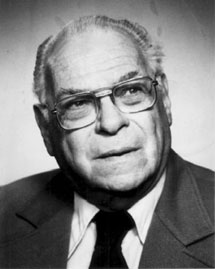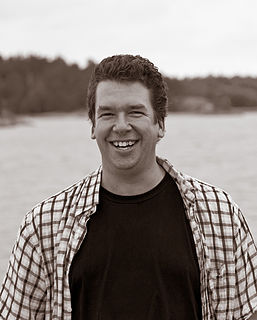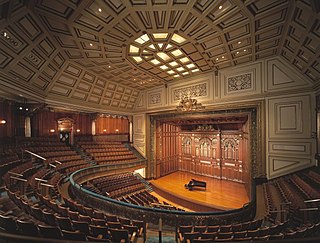History
The Ancora String Quartet became the String Quartet In Residence at the First Unitarian Society of Madison in 2006. They established a recital season there, garnering praise from music critics. [2] [3] They have also appeared twice on Wisconsin Public Radio's Sunday Afternoon Live From the Chazen series, broadcast live statewide, on Jan. 14, 2007 and April 6, 2008. [4]

The First Unitarian Society of Madison (FUS) is a Unitarian Universalist congregation in Shorewood Hills, Wisconsin. Its meeting house was designed by Frank Lloyd Wright and built by Marshall Erdman in 1949–1951, and has been designated a U.S. National Historic Landmark for its architecture. With over 1,500 members, it is one of the largest Unitarian Universalist congregations in the United States.

Wisconsin Public Radio is a network of 34 public radio stations in the state of Wisconsin. WPR's network is divided into two distinct analog services, the Ideas Network and the NPR News and Classical Network, as well as the "HD2 Classical Service," a digital-only, full-time classical music service.
In September 2008 the Ancora String Quartet launched its 2008-2009 Critics' Choice Season, featuring recital programs selected especially for the quartet by local music critics. [5]
Ellen Taaffe Zwilich is an American composer, the first female composer to win the Pulitzer Prize for Music. Her early works are marked by atonal exploration, but by the late 1980s she had shifted to a post-modernist, neo-romantic style. She has been called "one of America’s most frequently played and genuinely popular living composers." She was a 1994 inductee into the Florida Artists Hall of Fame. Zwilich currently serves as the Francis Eppes Distinguished Professor at Florida State University.
Joan Tower is a Grammy-winning contemporary American composer, concert pianist and conductor. Lauded by The New Yorker as "one of the most successful woman composers of all time", her bold and energetic compositions have been performed in concert halls around the world. After gaining recognition for her first orchestral composition, Sequoia (1981), a tone poem which structurally depicts a giant tree from trunk to needles, she has gone on to compose a variety of instrumental works including Fanfare for the Uncommon Woman, which is something of a response to Aaron Copland's Fanfare for the Common Man, the Island Prelude, five string quartets, and an assortment of other tone poems. Tower was pianist and founding member of the Naumburg Award-winning Da Capo Chamber Players, which commissioned and premiered many of her early works, including her widely performed Petroushskates.

Erkki-Sven Tüür is an Estonian composer.
Alfred Whitford (Fred) Lerdahl is the Fritz Reiner Professor of Musical Composition at Columbia University, and a composer and music theorist best known for his work on musical grammar and cognition, rhythmic theory, pitch space, and cognitive constraints on compositional systems. He has written many orchestral and chamber works, three of which were finalists for the Pulitzer Prize for Music: Time after Time in 2001, String Quartet No. 3 in 2010, and Arches in 2011.
John Harris Harbison is an American composer, known for his symphonies, operas, and large choral works.

Ulrich Leyendecker was a German composer of classical music. His output consisted mainly of symphonies, concertos, chamber and instrumental music.

Irving Milton Adolphus was an American pianist and composer.
Matthew John Hindson AM is an Australian composer.
Huw Watkins is a British composer and pianist. Born in South Wales, he studied piano and composition at Chetham's School of Music in Manchester, where he received piano lessons from Peter Lawson. He then went on to read Music at King's College, Cambridge, where he studied composition with Robin Holloway and Alexander Goehr, and completed an MMus in composition at the Royal College of Music, where he studied with Julian Anderson. Huw Watkins was awarded the Constant and Kit Lambert Junior Fellowship at the Royal College of Music, where he is used to teach composition. He is currently Honorary Research Fellow at the Royal Academy of Music.
David Frederick Stock was an American composer and conductor.

Laura Elise Schwendinger was the first composer to win the American Academy in Berlin's Berlin Prize.
Thomas Larcher is an Austrian composer and pianist.
Quartet San Francisco is a non-traditional and eclectic string quartet led by violinist Jeremy Cohen. The group played their first concert in 2001 and has recorded five albums. Playing a wide range of music genres including jazz, blues, tango, swing, funk, and pop, the group challenges the traditional classical music foundation of the string quartet.
Fabian Müller is a Swiss composer.

Svante Henryson is a composer, cellist, bass guitarist and double bassist, active within jazz, classical music, and hard rock.
Roger John Goeb was an American composer.
The Berkshire String Quartet was an American classical chamber group founded and funded in 1916 at the height of World War I by Elizabeth Sprague Coolidge. The quartet, originally, was the Kortschak String Quartet, named for Hugo Kortschak (1884–1957), a member of the Chicago Symphony Orchestra from 1907 until 1914. Kortschak was a key figure in organizing the Berkshire Chamber Music Festival founded by Coolidge. The original Berkshire String Quartet disbanded sometime after 1941.

Sebastian Fagerlund is a Finnish composer. He is described as “a post-modern impressionist whose sound landscapes can be heard as ecstatic nature images which, however, are always inner images, landscapes of the mind”. Echoes of Western culture, Oriental music and heavy metal may, for example, all be detected under the same Sky in the music of Fagerlund.

Scott Gendel is an American composer, pianist, and vocal coach. Gendel is known mostly for his art songs and choral music, but has also written numerous operas and musical theatre works, as well as orchestral and chamber music.














